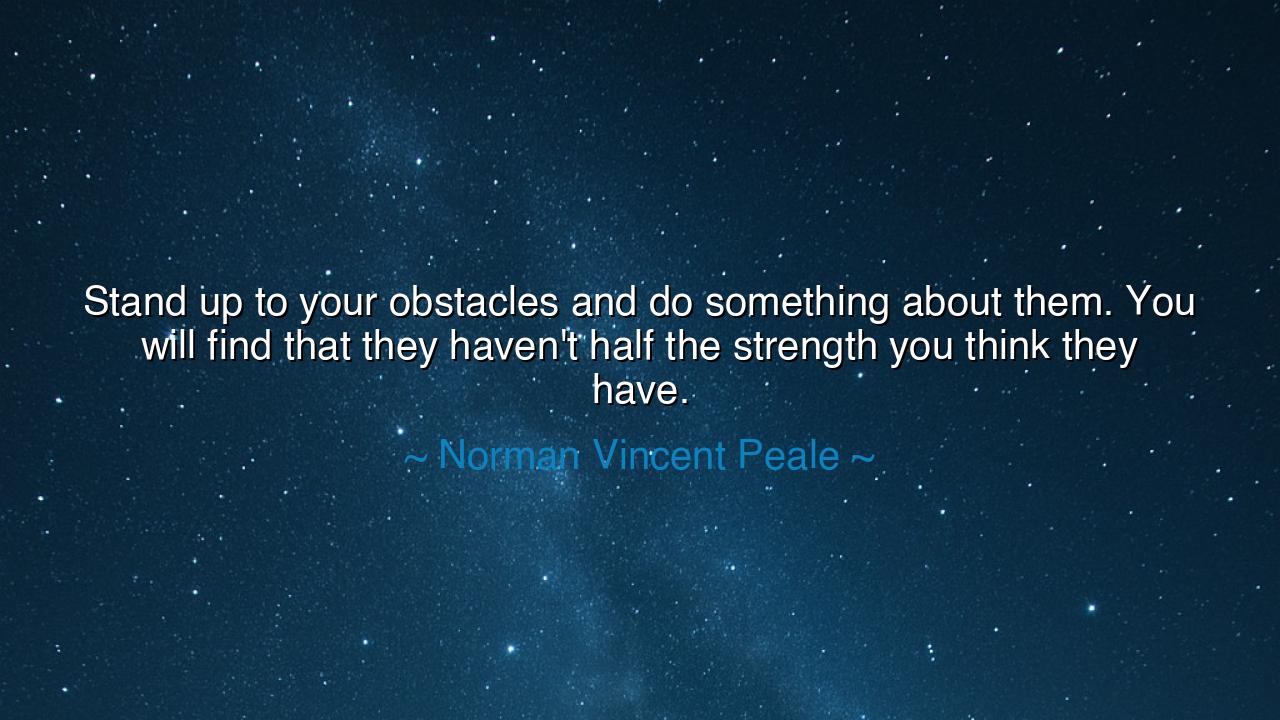
Stand up to your obstacles and do something about them. You will
Stand up to your obstacles and do something about them. You will find that they haven't half the strength you think they have.






Norman Vincent Peale once said: “Stand up to your obstacles and do something about them. You will find that they haven’t half the strength you think they have.” These words, though spoken in modern times, carry the timbre of eternal wisdom. For every generation has known the paralyzing weight of fear, the looming specter of difficulty that appears larger than life. Yet Peale reminds us that most obstacles are but shadows—menacing from afar, but frail when confronted with courage. To stand up is the first victory; to act is the second; and the discovery that the enemy was weaker than imagined is the third and greatest reward.
The ancients understood this well. They told of monsters that seemed invincible—dragons with fiery breath, giants that shook the earth, labyrinths filled with terror. But in each tale, the hero prevailed not because the creature was weaker than told, but because the hero found within himself the will to act. The obstacle grew smaller the moment it was faced, for fear magnifies all things, while courage restores them to their true size.
Consider the story of Rosa Parks, a quiet seamstress in Montgomery, Alabama. In her day, segregation loomed like a giant, casting its shadow over millions. Many believed it too strong to challenge, too deeply rooted to be shaken. But when Parks refused to give up her seat on a bus, she stood up to an obstacle that seemed immovable. What followed was the spark of a movement that reshaped a nation. The strength of that injustice, long thought unbreakable, began to crumble because one woman acted with courage. The obstacle had not half the power people imagined—it fell when resisted.
So it is in all our lives. The burdens we dread—failure, rejection, loss—loom like mountains from afar. Yet when we take the first steps to climb, we discover that the mountain is not infinite, but made of stone like any other, waiting to be conquered. Fear multiplies the size of every obstacle, but courage diminishes it, revealing that the true battle is not with the mountain, but with our own hesitation.
The lesson is plain: do not flee from your trials. Do not bow to imagined giants. Stand up and act, for the very act of confronting will rob the enemy of its illusion of power. Remember that the fiercest chains are often those forged in the mind. Break them with action, and you will discover the path to freedom.
Therefore, let each person cultivate the habit of action. When fear whispers, answer with a step forward. When doubt rises, meet it with effort. Begin small, if you must: speak the truth you fear to speak, attempt the task you dread, confront the problem you have long delayed. Each act of courage diminishes the obstacle, until at last it is seen for what it is—merely another stone upon your path, not a wall that blocks the way.
In practice, write down your greatest obstacles, then act upon them with resolve, even in small measures. Seek allies, gather wisdom, but above all, move forward. For the secret of power is revealed not in contemplation but in action. Each step weakens the shadow, each effort proves the truth of Peale’s words—that the strength of your obstacle is far less than your own.
Thus his teaching endures like a torch passed from age to age: do not cower before the shadow. Rise, act, press forward, and you shall see that what you feared was but a phantom. The strength is not in the obstacle—the strength is in you.






AAdministratorAdministrator
Welcome, honored guests. Please leave a comment, we will respond soon